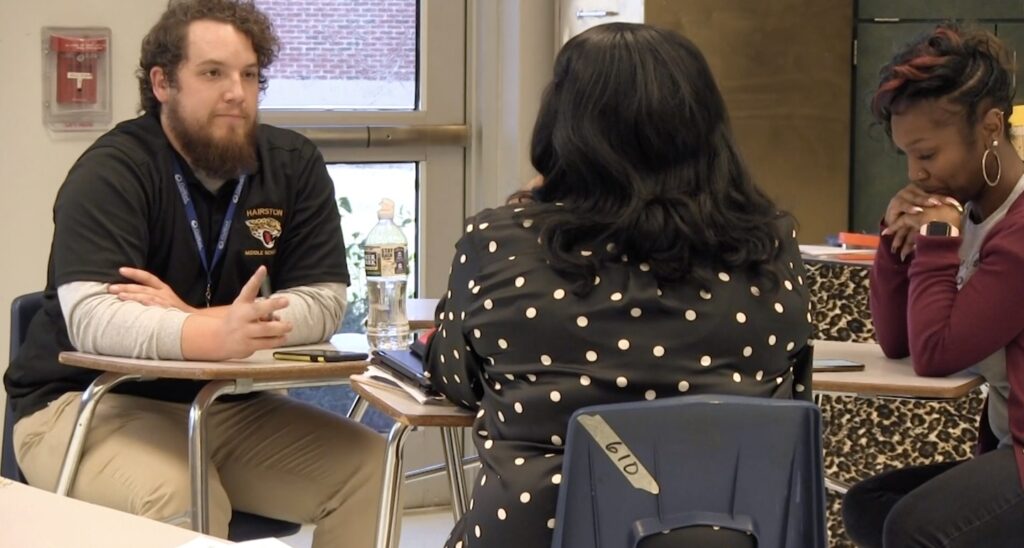

By having a strong recruiting and selection process, districts such as Winston-Salem/Forsyth County Schools (left) and Guilford County Schools are seeing stronger learning growth and educator retention.
For Nicole Hayes, recruiting educators to Nash County Public Schools means facing some stiff competition. Nash County abuts the much larger—and much wealthier—Wake County Public Schools in North Carolina.
And yet, “we’ve been able to retain teachers and bring some back to our district who left to go to Wake because their [pay] supplements are way higher,” she said.
Hayes, Nash’s Opportunity Culture® director, and her peers in other districts of varying size have successfully improved their recruitment efforts for Opportunity Culture® educator roles using some of the same strategies—garnering their districts not only more, but also stronger, applicants.
In recent interviews, Hayes and Opportunity Culture® directors in Winchester Public Schools in Virginia and Guilford and Winston-Salem/Forsyth districts in North Carolina all said they focused on starting early and targeting their outreach. Two of the districts have also lightened their hiring workloads by taking advantage of a professional learning opportunity for educators interested in the Multi-Classroom Leader® (MCL) role. Directors were especially focused on the MCL and Reach Associate roles, but the strategies work for all Opportunity Culture® team roles.
In part from having a strong recruiting and selection process, they say, students and teachers alike are benefitting, with stronger learning growth and educator retention. In Winston-Salem/Forsyth County Schools, Tina Lupton, executive director of professional learning, said that schools that struggled with persistently high teacher turnover saw dramatic turnarounds after implementing Opportunity Culture® models. Lupton looked at seven schools that began implementation in 2021–22, and found that on average, they cut turnover rates from 18% to 10%; one school, for example, went from an attrition rate of 25% to 11%, two others from 24% to 13%, and another from 15% to 5%.
District Leaders’ Recruitment Advice and Strategies
Start early, and watch your timeline
Begin recruitment efforts by December—January at the latest
When Guilford County Schools previously did its heavy recruitment push in March, “that resulted in tons of applicants, but so many of them were not qualified,” said Sean McWherter, who supports the district’s Opportunity Culture® schools. With more effort focused on early recruitment and special opportunities to learn the details and requirements for the available roles, “we actually reduced the number of total applicants we get, but overall, we have more-qualified applicants.”
In Winchester, principals appreciated a focus on the earlier timeline so they could get a jump on MCL hiring. “They wanted to make sure their MCL role was filled, because if [educators] are moving internally, knowing that domino effect of what happens, the earlier, the better was very clear,” said Jake Boula, executive director of PK–12 curriculum and instruction.
Encourage schools to settle their Opportunity Culture® plans early, to know what roles each needs.
“We were trying to get info out sooner, get plans finalized quicker, and then we can start with internal candidates,” Boula said. “We knew with the amount of interviews we’d done the year prior, we had to do it sooner.”
Use the Aspiring MCL Academy to attract high-quality prospective applicants
McWherter has many years of experience to learn from; Guilford began using Opportunity Culture® models in 2018–19. He now begins “soft recruiting” in December and January, advertising the Aspiring MCL Academy that Public Impact® provides (see here for details). These professional learning sessions help potential applicants learn about Opportunity Culture® designs and the MCL role and build some coaching skills. McWherter emails principals and current MCLs to encourage them to share details about the academy, advertises it on the district website, and holds interest meetings to encourage educators to apply for the academy.
In the first year using the academy, McWherter needed to staff about 40 positions—and got 40 academy participants. While not all who attend the academy go on to apply for an MCL position, “that gave us a great base of applicants who had high motivation and high interest. Where I used to do lots of in-person interest meetings, this took the need for all that completely out. So in time and effort, it’s so much easier now.”
Guilford gives academy participants CEUs, a $500 stipend for attending, and the Get Better Faster resource. “We try to incentivize and encourage someone who might be on the fence, thinking they don’t have time—this helps get people to sign up.”
In Winston-Salem/Forsyth, Lupton also found the academy valuable last year; for the 20 seats available, she had 57 applicants, and advertising the academy spurred general Opportunity Culture® interest.
When the selection process began in spring to get into the district hiring pool for MCL roles, “the ones that went through the academy versus the ones that didn’t, there was a significant difference in how they were able to talk through the interview questions,” Lupton said. “I think their mind was already in that role of an MCL.”
After the academy, McWherter keeps up a steady stream of emails to current principals and MCLs, more interest meetings, and more postings.
Because the requirements to get into the academy are the same as to qualify to apply for the MCL role, the screening process to get into the district pool becomes quicker and easier, McWherter and Lupton said.
Use information sessions, social media, district emails, and direct outreach
Make educators in current Opportunity Culture® schools aware of all openings, especially in schools about to begin using Opportunity Culture® models.
Nash County spread the word through district information sessions, all-staff emails, and social media, so staff knew they could apply for a role at another school, said Monique Hargrove-Jones, executive director of elementary education.
“We’re struggling as a district with retaining great teachers, so when we knew that we can incentivize some of our rockstar teachers [to stay by getting an MCL role], we would encourage them to attend an info session because we felt they would be a good fit—because we knew the impact they were making in one classroom,” said Melissa Dancy-Smith, Nash’s assistant superintendent of academics and accountability.
Spread the word in surrounding districts, and recruit with an eye for candidates with local ties.
In Winchester, Clarence Smith, the district’s recruitment and retention specialist, started holding virtual information meetings in January, followed by 12 career fairs in February that targeted regional colleges and HBCUs, because they find more success recruiting candidates who have local ties.
Along with Wake County, Nash County also abuts Wilson and Edgecombe counties, which both use Opportunity Culture® models. By the second year of implementation, Hayes said, “we knew that there were people in other districts looking for those positions, so we knew we had surrounding districts that were waiting to apply.”
Use separate information sessions for each role.
Directors in several districts highlighted the need to provide separate information sessions, especially for potential RAs. Helping current teaching assistants and prospective paraprofessionals feel comfortable in a session geared just to them can increase attendance, Hargrove-Jones said.
Sharpening her efforts for prospective RAs also allowed Lupton to fill the positions she had available; the district previously struggled to fill RA slots.
Recruitment works best when the conversation happens year-round, she said, so she worked to get consistent communication to current teacher assistants through the person at the district level who supports TAs. “Every time we got their group of teacher assistants together, [the RA role] was brought up”—as a slide at the end of every PD session, in newsletters, through individualized emails that highlighted an educator’s strengths and encouraged them to apply, and conversations with principals.
The district has increased support generally for TAs, she said.
“I think that because we’re providing more intentional [reading and math] professional development for teacher assistants, we’re getting them out of their comfort zone and getting them to be more instructionally thoughtful—they feel a different level of confidence in moving into these positions,” she said. “One thing I learned is that just sending them an email isn’t going to attract them, but having them be a part of the conversation and boosting their confidence is what’s getting us a better outcome.”
Use targeted, direct outreach to promising candidates.
Get principal feedback on staff members who may be good candidates for a role, and look at student outcomes to identify other possibilities. Through emails, conversations, or other communication, reach out to those educators to encourage them to apply.
Use your strongest advocates—current Opportunity Culture® educators.
“A lot of the MCLs advertise for us, which we ask them to do—they are generally our best recruitment tool,” McWherter said.
Alongside recruitment, focus on a strong selection process
Learn from the data—both within the district and in Opportunity Culture® schools nationwide.
By the second Opportunity Culture® year, Winchester’s leaders were able to see more clearly what qualities were needed to be a successful MCL. The district tightened up its process and expectations for applicants to make it through to the hiring pool.
A strong district screening process is a must, Boula said, but once candidates make it into the district pool, he found principals still needed more information about who might be good in a certain grade or subject, to get that “just-right” fit.
Nash also worked to set a high bar for the MCL role, but not so high that potential applicants felt they shouldn’t even try. Each year it gets easier, Hayes said, as the roles become familiar—and as educators continue to improve through MCL team support, a sentiment McWherter echoed.
“We did up the [MCL] requirement last year, and we’ve done pretty well filling those positions because of people coming back home, and this coming cohort will be easier because it’s better known throughout the district, so there’s less fear about the unknown,” Hayes said. “And principals are doing a better job of communicating what OC is doing in their schools—so we’re looking forward to an easier process.”
In the most recent student learning growth results from the state, two middle schools in Nash’s first yer of implementation exceeded growth expectations; the fact that principals attribute success to Opportunity Culture® also helps with recruiting, Hayes said. “We are crediting OC schools with a huge part in our no longer being a ‘low-performing district.’ We’re creating a better pool of instructional support, and that’s been really exciting.”
